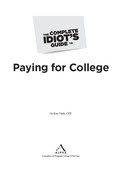Tapping Your Retirement Funds
When it comes to paying for college, few things scare me more than the idea of people using their retirement nest eggs to pay for a college education. In fact, nothing derails more people’s retirements than a failure to plan properly for a college education.
The peril isn’t hard to see. Most people are between 40 and 60 years old when their first child heads off to college. At this point, they have somewhere between 5 and 25 years left to accumulate enough money to last them the rest of their retired lives. Because many of them are just reaching their peak earning years, this is the time when they should be playing catch-up, using their earning years to sock away money into retirement plans. Instead, paying for college forces them to do just the opposite. Not only do many people cease funding their company’s 401k or an IRA for themselves, but they often dip into this money through a loan or withdrawal. All this leaves them staring down retirement with little hope of regaining their financial footing in time.
In short, using your retirement assets for a child’s college education is the equivalent of a financial suicide mission. It’ll probably do the trick, but you’ll be the one to pay the price. Just remember, there are such things as student loans, but no such thing as a “retirement loan.” You’re much better off to have your student take out a loan and promise to help her repay it than give up your retirement funds and hope your student will take care of you.
Withdrawals Can Cost 45 Percent
Perhaps the most important thing to realize—and a fact that confuses many parents and students—is that a retirement plan withdrawal for college can cost you a ton in taxes. This confusion comes from the fact retirement plan withdrawals for college expenses are not subject to the 10 percent early withdrawal penalty. Many parents mistakenly think this means that these plans are also not subject to tax, which they usually are.
With the top federal income tax rate of 35 percent in 2010 and state income tax rates nearing 10 percent in some states, you could potentially lose up to 45 percent of a withdrawn amount to taxation. Even though that might still seem like something that moves you a step closer to solving the college money puzzle, it’s one giant step backward for your financial future.

CHEAT SHEET
If you absolutely have to take a withdrawal from a qualified retirement plan to pay for college expenses, you might want to consider minimizing the taxes withheld by your employer or IRA custodian. Just because they want to withhold 20 to 30 percent for federal and state taxes, you might not actually owe that. If you typically pay little or no taxes every April 15, you will not likely owe much more with your withdrawal, especially considering the additional tax credits you will likely receive for paying education expenses.
Wisdom Against Taking a 401k Loan
Because 401k and other retirement plan loans are not subject to taxation on the loan amount, many parents and students see this as a viable way to access these balances. Generally, however, this is a very poor option in comparison to using a student loan, for a number of reasons:
• Your assets freeze—Most retirement plans remove (un-invest) assets equaling the loaned amount from your retirement portfolio. This means that the growth of these assets essentially freezes during the loan repayment period, except for the interest you pay into the account.
• Your paycheck drops—The payments for your retirement plan loan are typically made directly from your paycheck, which means the paycheck you were getting just got smaller. Many people living paycheck to paycheck who are also now struggling to pay tuition don’t realize this and end up finding themselves financially overstretched after taking a 401k loan.
• It still could be taxable—If you quit, retire, or get fired from your employer before your retirement loan is repaid, it will be re-characterized as a taxable distribution. This means it is added to the income you have to report on your tax return, as well as possibly being subject to the 10 percent penalty.
..................Content has been hidden....................
You can't read the all page of ebook, please click here login for view all page.
